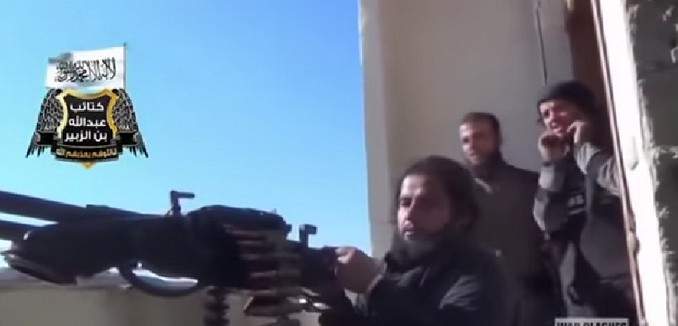Two recent reports in major publications have documented the growing discontent within the ranks of the Islamic State of Iraq and Syria (ISIS) that is beginning to threaten the group’s cohesion, even as it seeks to expand upon the territory it controls.
The Washington Post reported on Sunday:
Reports of rising tensions between foreign and local fighters, aggressive and increasingly unsuccessful attempts to recruit local citizens for the front lines, and a growing incidence of guerrilla attacks against Islamic State targets suggest the militants are struggling to sustain their carefully cultivated image as a fearsome fighting force drawing Muslims together under the umbrella of a utopian Islamic state.
The anecdotal reports, drawn from activists and residents of areas under Islamic State control, don’t offer any indication that the group faces an immediate challenge to its stranglehold over the mostly Sunni provinces of eastern Syria and western Iraq that form the backbone of its self-proclaimed caliphate. Battlefield reversals have come mostly on the fringes of its territory, while organized opposition remains unlikely as long as viable alternatives are lacking and the fear of vicious retribution remains high, Syrians, Iraqis and analysts say.
The Post quotes Lina Khatib, director of the Carnegie Middle East Center in Beirut, who said, “The key challenge facing ISIS right now is more internal than external. We’re seeing basically a failure of the central tenet of ISIS ideology, which is to unify people of different origins under the caliphate. This is not working on the ground. It is making them less effective in governing and less effective in military operations.”
There is a growing divide between the foreign fighters who were drawn to ISIS’ self-proclaimed “caliphate” and the Syrians and Iraqi members of the group. The foreigners are offered better pay and allowed to live in cities, which are removed from the fighting and Western airstrikes. These advantages cause resentment among the locals. While ISIS’s military setbacks have been on the fringes of the territory it holds, in those areas it has been harder to recruit fighters, with ISIS now “recruiting fighters among children and teens who remain more vulnerable than older adults to the group’s propaganda.”
Despite the better treatment, some foreigners appear to have been more interested in living in a caliphate than in fighting for it. Many are seeking to flee back through Turkey, though some have been reportedly caught and killed.
The Wall Street Journal also reported (Google link) yesterday on the growing tensions within the group.
Islamic State is struggling to maintain unity and discipline amid corruption, ideological differences and defections that have mounted along with the expansion of its ranks and cash coffers.
In addition to the other problems facing ISIS, the Journal also described the growing corruption within the group.
The group also faces problems managing cash as its ranks and operations expand, with more emirs, or princes, directing various governmental departments across Islamic State provinces and reporting to Mr. Baghdadi. Oil sales, extortion, looting, kidnapping for ransom and donations are generating as much as $5 million in proceeds each day, U.S. officials say, all of which Islamic State needs to govern the territory it has conquered. That, in turn, has led to corruption.
In February, two Egyptians overseeing Syria’s Deir Ezzour province for Islamic State fled with thousands of dollars of the group’s funds, including profit from al Omar oil field, the country’s largest, said residents of the province.
The head of Islamic State’s religious police in the eastern Syrian city of Raqqa, the group’s de facto capital, stole thousands of dollars from the organization’s coffers before fleeing to Turkey in January, said area residents. Mr. Hassan, the analyst, said he also had evidence of growing graft within the group.
While neither report suggests that ISIS is on the verge of collapse, the emerging weaknesses displayed by the group raise questions over whether Iran’s help is really needed to defeat it.
Michael Pregent asserted that Iran’s help is not needed to defeat ISIS in I Saw the U.S. Hand Iraq Over to the Iranians. Is the Whole Region Next?, which was published in the February 2015 issue of The Tower Magazine.
However, if the U.S. demonstrates—as it did in 2007—that it is an honest broker that can ensure Sunnis are not targeted by sectarian forces, then it is very probable that the Sunnis will cooperate. This would generate a Sunni force that will be more than sufficient to deal with ISIS in the same way the Sunnis did with AQI in 2007. If this is coupled with precision targeting by the ISF, aided by U.S. advisers who can work to prevent collateral damage to the Sunni population in general; and bolstered with sufficient funding to arm, recruit and pay Sunni fighters; then the momentum ISIS has enjoyed will end, and it will ultimately be defeated.
More than anything, however, the U.S. must learn from its previous mistakes. It cannot bring security and stability back to Iraq if it continues to allow Iranian influence over the Iraqi government, the Shia militias, and the fight against ISIS in general. Contrary to the opinions of many observers and officials, Iran is not simply fighting ISIS; it is helping sectarian forces fight a larger war against the Sunni population of Iraq in order to maximize its power over the entire country.
As a result, the U.S. cannot allow itself to be identified with the Iranian cause. If it does, then it is likely that, if ISIS is defeated, the U.S. will simply have exchanged one group of Islamic extremists for another—an Islamic State for an Islamic Republic—and end up empowering a regional actor that is dedicated to expanding its power and influence at the expense of the U.S. and its allies. To allow ISIS to win the battle for Iraq would be a disaster. But to allow Iran to win the battle for Iraq—and the region in general—would be far worse.
[Photo: Real Combat Footage / YouTube ]




